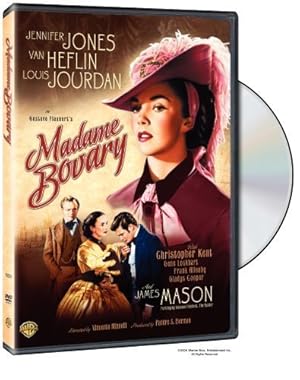
Madame Bovary Page #2
- PASSED
- Year:
- 1949
- 114 min
- 685 Views
Emma Roualt, motherless,
had attended a convent|in the provincial city of Rouen.
Emma at first detested the convent.
The scales, the eternal scales, when|she might have been learning love songs.
The discipline, the dreadful conformity.
The eternal uniform,|when a girl's young body is budding.
Perhaps it was the discipline itself|and Emma's discontent
that drove her to dreams, and taught|a lonely girl to live within herself.
For these became the happy years,|these convent years,
when a young girl's mind could wander.
And then, as if to feed her dreams,
there was the old Swiss seamstress who|sang the love songs of the last century
and told stories about|love in a Swiss chalet
and love in a villa in Italy,
and to make|the geography lesson complete,
slipped them on the sly|novels forbidden by the sisters,
so they could read about|love in a cottage in Scotland
and love in a castle in Spain.
Novels, novels.
She lived in a world of love,|lovers, sweethearts,
persecuted ladies fainting|in lonely pavilions,
horses ridden to death on every page,
gentlemen, brave as lions,|gentle as lambs,
always well-dressed|and weeping like fountains.
Oh, love in Italy! Oh, love in Spain!
It seemed to Emma that certain places|on Earth must bring happiness,
as a plant peculiar to the soil|that cannot thrive elsewhere.
She would find it someday.
Happiness.
Fashion.
High romance.
One kind of dream and another kind of life.
The convent years ended|and Emma returned to the farm.
Had she been a normal girl,|her dreams might likewise have ended,
but in Emma|there was a terrifying capacity
for pursuing the impossible.
The dream did not end.
She had learned to be a woman for whom|experience would always be a prison,
and freedom would lie always|beyond the horizon.
Here, in these books, in these pictures,|we had taught her
that the strange was beautiful|and the familiar contemptible.
We had taught her to find glamour,|excitement, in the faraway
and only boredom in the here and now.
We had taught her what?
To believe in Cinderella,
and now, here, this morning,|Charles Bovary.
Emma Roualt, you cannot know.|He is not Prince Charming.
He is only a man.
It was very wise of you|to consult me, Doctor.
In all matters of wills, deeds, notes,|assignments, etcetera, etcetera,
I am at your service.|My mind is a storehouse of details.
You will need a house.
Monsieur Guillaumin,|I haven't decided yet.
You will. Leon!
Leon, please make a note.
A house for Dr. Bovary.
and a rear entrance through which the|doctor may come and go out on his calls.
You see, I think of every detail.
Monsieur, the detail|that I want to know is,
Translation
Translate and read this script in other languages:
Select another language:
- - Select -
- 简体中文 (Chinese - Simplified)
- 繁體中文 (Chinese - Traditional)
- Español (Spanish)
- Esperanto (Esperanto)
- 日本語 (Japanese)
- Português (Portuguese)
- Deutsch (German)
- العربية (Arabic)
- Français (French)
- Русский (Russian)
- ಕನ್ನಡ (Kannada)
- 한국어 (Korean)
- עברית (Hebrew)
- Gaeilge (Irish)
- Українська (Ukrainian)
- اردو (Urdu)
- Magyar (Hungarian)
- मानक हिन्दी (Hindi)
- Indonesia (Indonesian)
- Italiano (Italian)
- தமிழ் (Tamil)
- Türkçe (Turkish)
- తెలుగు (Telugu)
- ภาษาไทย (Thai)
- Tiếng Việt (Vietnamese)
- Čeština (Czech)
- Polski (Polish)
- Bahasa Indonesia (Indonesian)
- Românește (Romanian)
- Nederlands (Dutch)
- Ελληνικά (Greek)
- Latinum (Latin)
- Svenska (Swedish)
- Dansk (Danish)
- Suomi (Finnish)
- فارسی (Persian)
- ייִדיש (Yiddish)
- հայերեն (Armenian)
- Norsk (Norwegian)
- English (English)
Citation
Use the citation below to add this screenplay to your bibliography:
Style:MLAChicagoAPA
"Madame Bovary" Scripts.com. STANDS4 LLC, 2024. Web. 26 Apr. 2024. <https://www.scripts.com/script/madame_bovary_13118>.


Discuss this script with the community:
Report Comment
We're doing our best to make sure our content is useful, accurate and safe.
If by any chance you spot an inappropriate comment while navigating through our website please use this form to let us know, and we'll take care of it shortly.
Attachment
You need to be logged in to favorite.
Log In